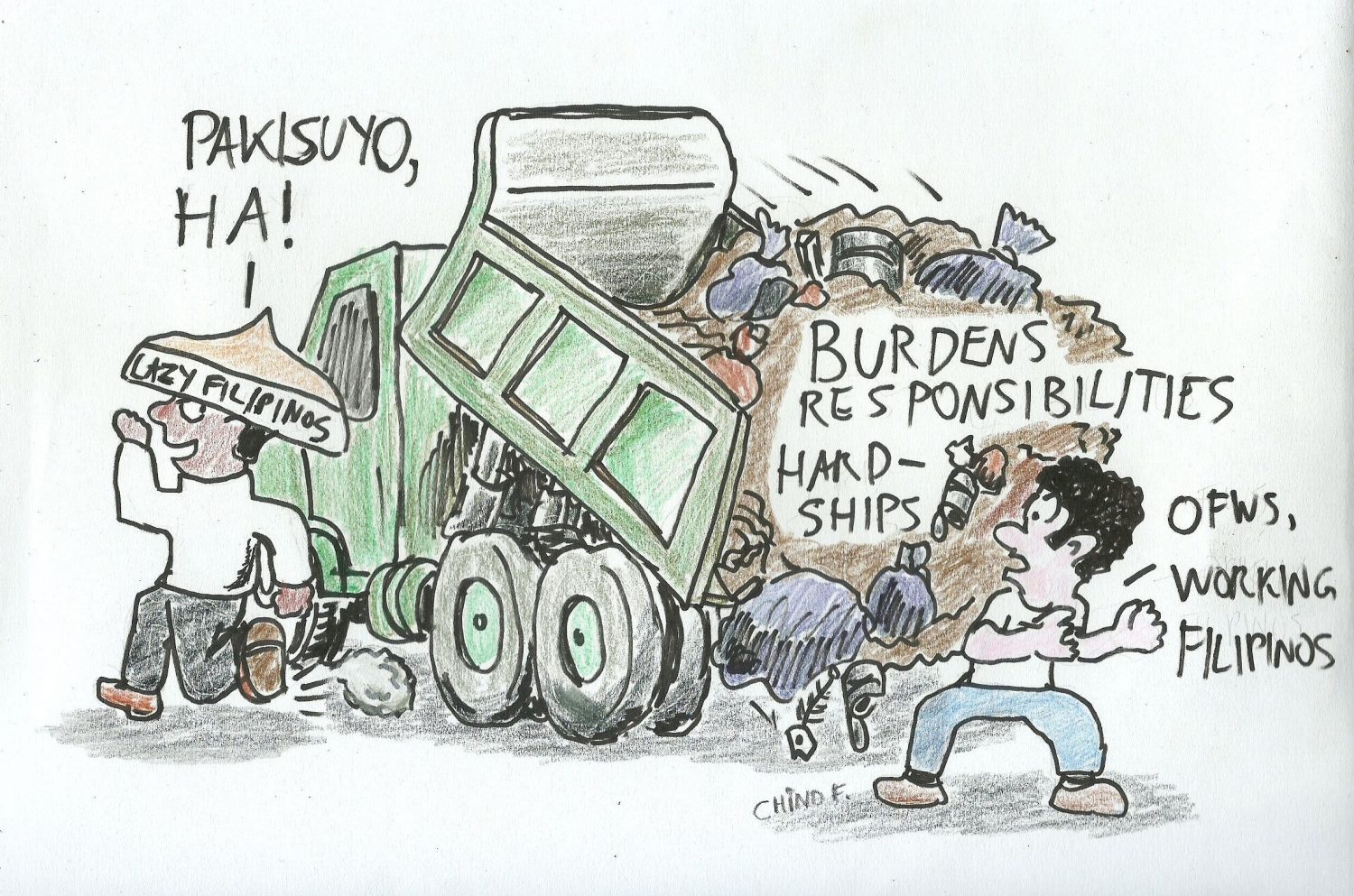When our webmaster Benign0 wrote about the problem of “pakiusap” (requests, usual the asking of special favors that sometimes lead to impunity), I was reminded of another “paki” word – pakisuyo. It means to ask someone to do something for you. Another is paubaya – to entrust something to someone. Sometimes, I see the word translated as “to abandon.” There are situations where either applies without problem, such as the manner of passing fare within a jeep (pakisuyo ng bayad) or entrusting a child to a reliable relative when the parents die (ipaubaya ang anak sa iba). But pakisuyo and paubaya are abused many times because of how many Filipinos like to dump their responsibilities and burdens on other people.
Of course I will link this to the Filipino brand of mooching and freeloading. Because of laziness, some people want pakisuyo and paubaya for everything in their life. They want others to get food and water for them, they want others to clean for them, to buy things for them, to take care of their children for them while they go out and have fun, and more. Perhaps the worst pakisuyo of all is avoiding work and depending on the working relative here or abroad to provide for all their trivial dopamine needs.
| SUPPORT INDEPENDENT SOCIAL COMMENTARY! Subscribe to our Substack community GRP Insider to receive by email our in-depth free weekly newsletter. Opt into a paid subscription and you'll get premium insider briefs and insights from us. Subscribe to our Substack newsletter, GRP Insider! Learn more |
A result of this mindset is Filipinos having a contest in life on who is the master, who’s the slave. That’s what webmaster Benign0 called being “culturally hobbled by a compulsion to assert class dominance over the other.” Instead of a healthy society, it becomes a primitive, quarrelsome, dog-eat-dog, destructive society. The story of My Family’s Slave demonstrates the all-too-noisy nasty side of Filipinos, which is sometimes shelled out on paid workers too. Having house servants is also worth questioning, compared to how many families in other countries make it without any such arrangement. That’s why Zaxx’s proposal to end the culture of having house help appeals to me.
I also link a few things that older people experienced to pakisuyo and paubaya. First, look at home improvement in the Philippines. An Ateneo college teacher once remarked on how Americans have a fascination with power tools, that they had a whole sitcom about it. It’s because of how that culture values “Do-It-Yourself,” so there’s a market for do-it-yourself tools. Compare that to the Filipino scene, were we see more of “pagawa,” or we have someone else do it for us. I saw someone comment on a nostalgia Facebook page that back in the 1950s or 60s, when you’d buy a new television set, you’d have the TV installer man even do the plugging for you.
I remember the time when our water bill was under a name we didn’t know. A relative who was a plumber explained that in those days, people would not apply for their own services, but would “make pakisuyo” and have someone else do it. Perhaps the actual owner failed to supply enough details, so the “utusan” (guy ordered around) would use their own name. Thus, we had someone we didn’t know (and was probably already long dead) as the name on our water bill for years. We were able to correct it later on during our home rebuilding, but such was the folly of old pakisuyo.
So I may get the retort, what the hell is wrong with you? You also want help at times, so don’t you want to get it? Well, you do know what we write about in this site. We’re against freeloading and believe help is not an entitlement. I’ve also written before that a situation of help or dependence is not an instant outpouring of love; many have helped people without having any love for them (often for something in return, as politicians do). Also, when you need help, it’s often not a normal situation. It is something that should seldom happen. Of course, it is better and more compassionate to help when you can. But to punish someone for not doing it, if it’s not extremely serious (such as bypassing someone drowning in the water or not helping someone who got run over by a car) is wrong. Of course, we believe “helping” slackers or freeloaders who refuse to work is actually rewarding wrongdoing.
But another thing is, not everyone who claims to need help actually does. Some just prefer to have servants for the sake of laziness; they can be seen as freeloaders. Or let’s put it in modern terms: it’s against the equality and personal responsibility that democratic societies promote.
Also, as Thaddeus Grimwald explained, the more ignorant you are, the more you can be taken advantage of. People will pretend to be experts and can dupe you, convincing you that they can do everything for you. Then you later learn that they ran away with what you invested. Basically the Jack Welch quote below.
Another idea is that, in Filipino culture, being alone is seen as bad. One reason for this could be that the fear of being alone means the fear of not having someone to order around. There is also shaming and bias against people who like being alone, portraying them as selfish. For example, when a Filipino is seen buying some food on his own, other people such as co-workers and family get mad at him, saying he’s selfish for not buying more food for them, even if they are not hungry. This is more like moochers trying to shame people they couldn’t mooch on.
Where pakisuyo is appropriate would include helping little children, the elderly, people with disabilities and similar. These who are truly marginalized, not the pretend-marginalized like those who join the party list slot in Congress. That would include people like Nick Vujicic, the famous guy with no limbs. But still, look at Vujicic; he still goes to work even if it’s doing talks and tries to do things like swim. He doesn’t sit down and wait for people to take pity on him. He goes out and does things. I also remember a feature on GMA that featured a local guy with no arms, but he works moving stones with his legs. He said that nothing will happen if you wait for help; it’s better to go out and help yourself. The one below might be a different guy, but he works nonetheless.
I’m reminded also of Orem’s Nursing theory of self-care. The theory is that humans normally could do things themselves, such as brush their own teeth, stand, walk and others. Self-care is considered a normal thing. When sick or injured, they sometimes lose those abilities and nurses have to help them with those functions. But the nurse also helps in recovery so that the person can resume those functions themselves, because self-care is the normal state.
One of the effects of having this pakisuyo-all-the-time attitude is a learned helplessness. That’s another crippling flaw of our culture others have mentioned. This learned helplessness has also crept up to the national level. Webmaster Benign0 has lamented many times on how we remain dependent as a country, likely on the belief that since we are “oppressed” by other countries, those other countries are obliged to give dole-outs to us. It even applied to how we treat the South China Sea and Spratlys problem. And the latest is Benign0’s elucidation on our OFW dependency being more a liability than a strength, and it gives us an illusory sense of self-importance on the world scene. That keeps us from being a prosperous country.
Filipinos must work into their culture the values of self-sufficiency and independence. They must also stop demonizing independence and people “not helping others” or “not sharing.” They must appreciate more the “Do-It-Yourself” mentality, where people realize that the best way to get what’s best for them is to do it themselves. Also, they must stop seeing being alone or solitary as evil or selfish. They must also stop seeing getting things for oneself without giving out extras as wrong. And they must work in themselves the values of real patience and deferring of gratification, and stop demonizing those who don’t give them what they want. And lastly, undo the learned helplessness that we hold on to as an excuse for abandoning our responsibilities.
It involves reminding people that pakisuyo and pakiubaya are emergency measures, and not intended to be regular things. Because if they do become a regular thing, then that’s not only a lazy society, but a society that could break down. It breaks down because no one wants to move, and because they expect the other one to. Some Filipinos would like to say pakisuyo and paubaya are uniquely Filipino, but as habits, they’re actually dragging us down. It’s time to reduce these, or perhaps in some cases eliminate them.
I believe, as my cohorts here do, that what Filipinos embrace as their culture is what actually pulls the country down. And those who seem to be anti-dictators, who may also believe themselves to be “heroes,” are the real dictators.


It is our “stinking culture”. Change the Mindset of Filipinos and you will surely change this “stinking culture”.
After 9 years (since 2009), I think I do know a lot of the Philippine culture but I also think that what I know is just the tip of the ice berg. What I do know is that I dont understand the culture at all and why its still there (High Context Culture; Utang Na Loob, “Juan Time”, to name just a few aspects).
@Robert Haighton:
I, myself is a Filipino, but I cannot understand some of the culture. I grew up with, and was told by my parent and my elders, to follow the culture. Not question , about them.
Only when I immigrated to the U.S., that I learned that , there are other cultures. I saw/felt that some of the Filipino culture, are making us stagnant, in thinking , and the way, we live our lives. The Roman Catholic Church, and other religions, that Filipinos follow, also contribute, to our stagnation.
Change the mindsets of people; and we will change the culture, where they are tied to…
Thanks Hyden,
The very first time I visited PH, it was really a traditional culture shock for me. Now, I just take it as it happens but try to keep and do keep my senses (and common sense) alive.
What baffles me – maybe – most is that siblings dont address each other by their first name but using ‘ate’, ‘dong’, ‘dai’, ‘kuya’. That is really surreal for me, even today.
There is no such thing as helplessness. It’s just another word for giving up.